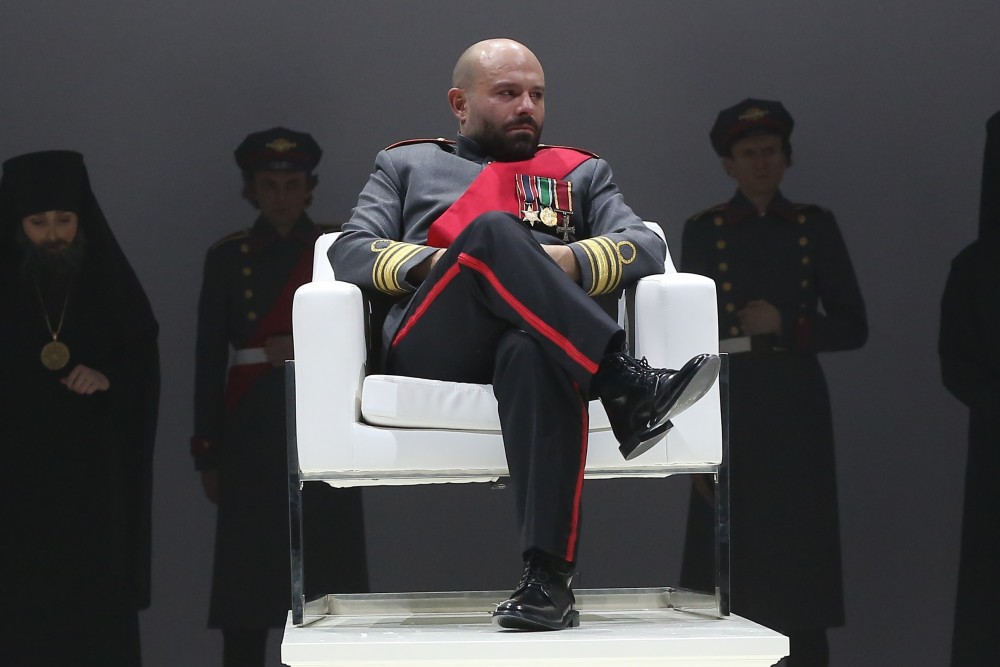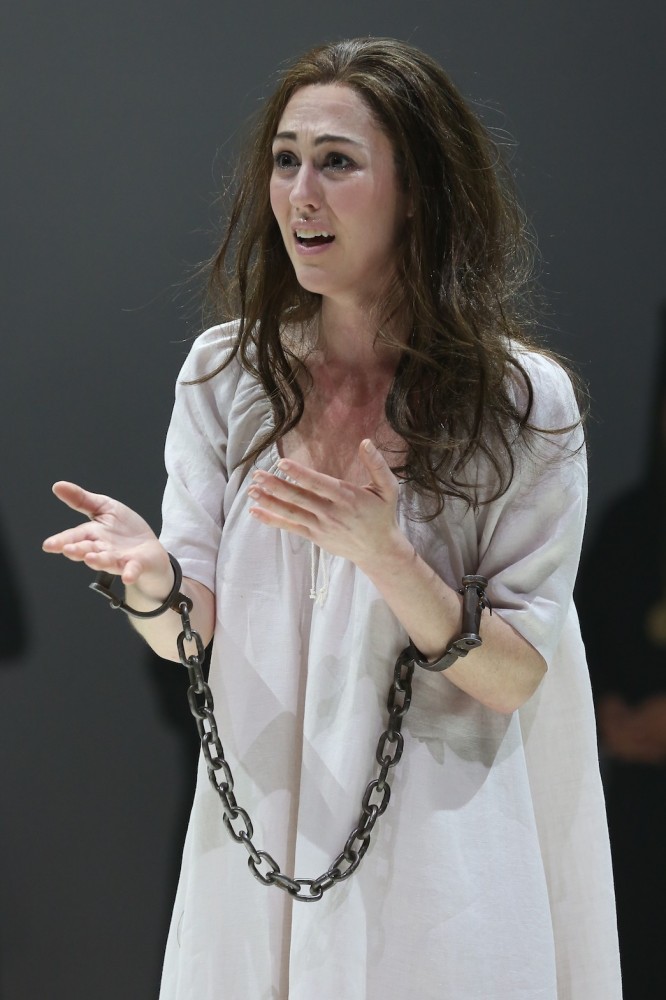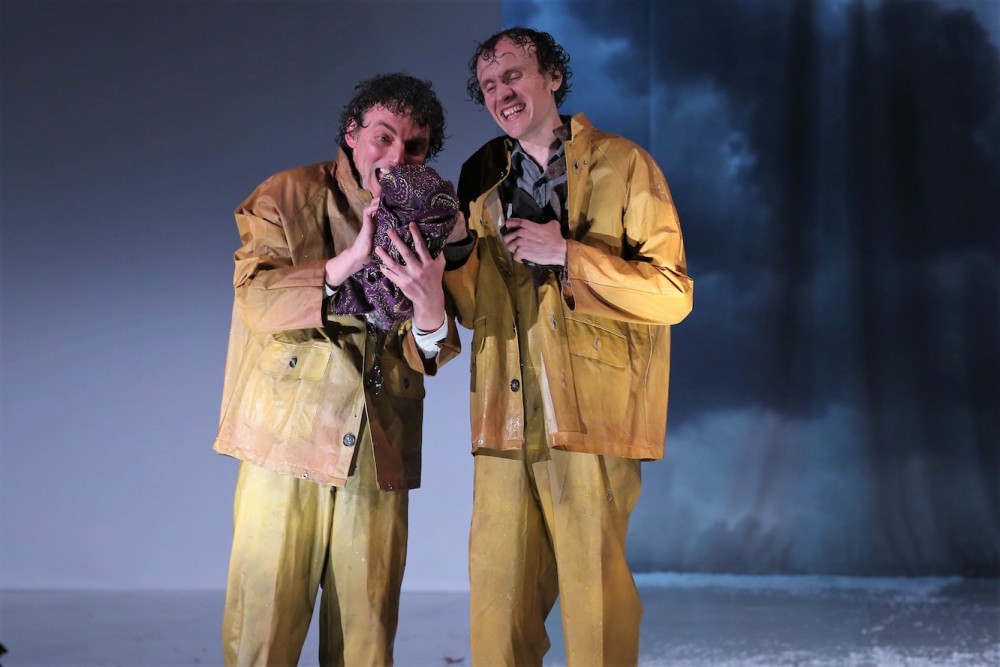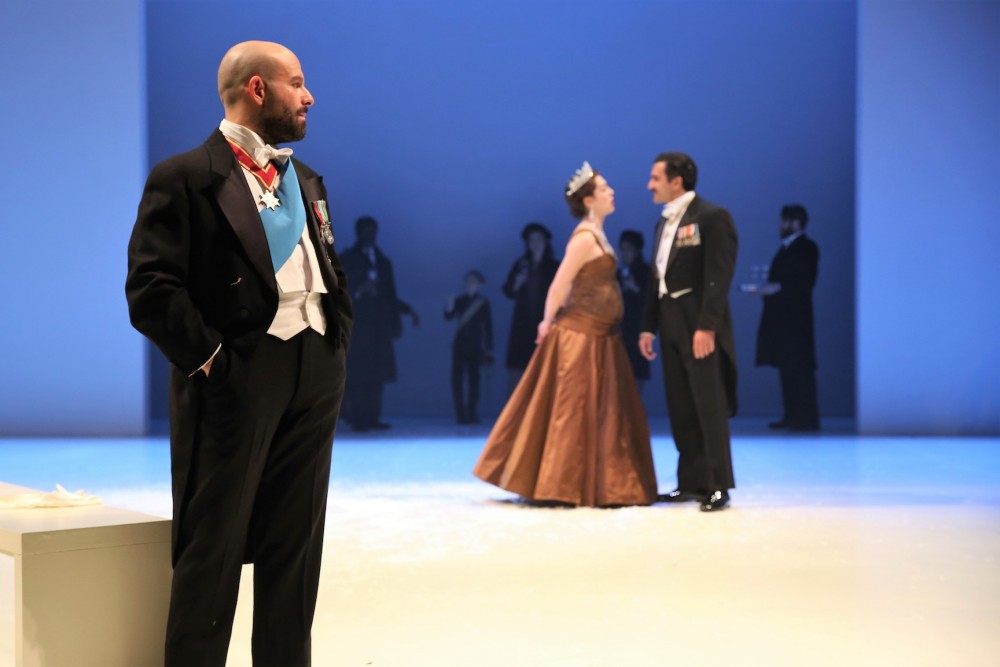
Anatol Yusef
by JK Clarke
The madness of Leontes, King of Sicilia is puzzling. Erupting from seemingly nowhere it ruins his life in short order; and it just as quickly dissipates. Presumably forever. This doesn’t follow with conventional understandings of mental illness, but it’s part of the grand suspension of disbelief that allows an audience to get through William Shakespeare’s late Romance play, The Winter’s Tale. To nudge us into that world of unlikeliness, in Theatre for a New Audience’s compelling new production (running through April 15 at the Polonsky Shakespeare Center in downtown Brooklyn), esteemed director Arin Arbus kicks the play off in a bright, snowy wonderland, with a large, sharp clawed bear dancing and throwing snow at audience members. Then becoming chilly, he throws on a white scarf and crawls into a cave to hibernate. It’s a foreshadowing of a scene at the end of the first act initiated by perhaps the most famous stage direction of all time: “Exit, pursued by a bear.”


Arnie Burton
But back to Leontes. He has every reason to be happy: a beautiful son, wife nine months pregnant, and all is well in the kingdom. Except his best friend Polixenes (Dion Mucciacito), King of Bohemia, has announced his imminent departure, having stayed already nine (oh really?) months. Anatol Yusef (best known for his work on HBO’s “Boardwalk Empire” as mobster Meyer Lansky) as Leontes is diminutive, tender, loving and, apparently, incredibly insecure. When his lovely wife Hermione (fabulous Kelley Curran) succeeds where he has failed in persuading Polixenes to stay, he snaps. “. . . my heart dances,/ But not for joy; not joy.” He’s suddenly convinced, by the coincidental, that his queen and best friend are not only having an affair, but that Polixenes is the father of his unborn child.
Things unravel quickly. The king tries to have Polixenes poisoned, but his nobleman, Camillo (compassionately played by Michael Rogers), warns his target and they flee. This only serves to convince Leontes further, and he jails bewildered Hermione (“You’re speaking a language I know not,” she trembles) for adultery. At her trial the Oracle of Delphi’s judgment is read: Hermione is chaste! But disbelieving Leontes is having none of it and rails against the gods and Apollo’s judgment. His punishment is swift: both his son Mamilius (delightfully played by young Eli Rayman) and wife die within moments. Thunderstruck, Leontes repents . . . but too late. Unlike what we know about actual mental illness, his insanity has swept in and out of his life—to devastating effect—within a matter of days, and for all we know he never becomes so unhinged again.


Kelley Curran
Meanwhile, his newborn daughter, Perdita, has been whisked away to faraway lands by nobleman Antigonus (Oberon K.A. Adjepong). On the shores of Bohemia he is confronted by our old friend, the foreshadowed Bear (Arnie Burton in a rather realistic bear suit). They face off, and engage in various sorts of comically mimed and mimicked battle à la the famous mirror scene in the Marx Brothers’ Duck Soup, with some elements of The Karate Kid thrown in. Sadly, upon following the famous stage direction, Antigonus is devoured by the pursuing bruin.


John Keating and Ed Malone
Fortunately, the infant, Perdita, is discovered by an Old Shepherd (John Keating) and his clown of a son (Ed Malone). And after intermission we are informed by white beareded Time (Robert Langdon Lloyd) that sixteen years has passed and we are now in Bohemia and the scene has transformed from cold, austere winter to joyous, verdant springtime. By a remarkable stroke of fortune, young Perdita (lovely Nicole Rodenburg) has fallen in love with the Prince (son of Polixenes) Florizel (bright-eyed and enchanting Eddie Ray Jackson). Polixenes, however, violently disapproves of their union. Upon discovering them at the merry Sheep Shearing Feast (a merry affair with beautiful dances and interplay choreographed by Austin McCormick), he threatens her and her adoptive father,with death if they are seen again in Florizel’s presence. The lovers flee to Sicilia to ask Leontes for his blessing. Polixenes, however, is hot on their heels and all comes to a boil in Leontes’ court, where it is revealed that Perdita is Leontes’ lost daughter. Then, in a seriously-suspend-your-disbelief moment, a statue of Hermione is unveiled. And what a statue it is! To the amazement of all, it comes to life, and the family is reunited.


Arnie Burton
Productions of The Winter’s Tale are often burdened with overlong, tedious scenes, particularly with Autolycus—a punk, thief and con man—whose songs and diatribes verge on pointless. Some directors choose (successfully) to eliminate Autolycus altogether. But in this very thorough production, not only are his shenanigans successful, they may even be the highlight of the production. Arnie Burton’s Autolycus is a delight, as he breaks the fourth wall and interacts with audience members, rifling through their possessions them and making hilarious callbacks to their prior interactions. On the night I attended, he handed a young woman his fake mustache beard to hold for a moment whilst he went incognito, but she nervously wadded them up, rendering them useless. His long, hilarious long gaze of disdain at the mortified young woman brought down the house. And his comic interplay with Shepherds Ed Malone and and John Keating belied their professional skills in clowning and physical comedy.
The mostly top-notch acting aside, Arbus’s team creative team rounded out a crisp, elegant production. Most notably, Emily Rebholz’s (Dear Evan Hansen) straightforward contemporary costumes (Soviet-era austerity in one court, and vintage hipster chic in another) were crisply elegant and gorgeously tailored, fitting every actor perfectly and naturally, augmenting the clean, stark and impactful set by Riccardo Hernandez, given definition by Marcus Doshi’s moody hues of light.


Eddie Ray Jackson, Oberon K.A. Adjepong (center) and cast
This iteration of The Winter’s Tale is an ideal production for both Shakespeare aficionados seeking a (finally!) complete version of the play, as well as those who want an easy-to-follow version of this sometimes confusing, often illogical, but, of late, much beloved Shakespeare play.
The Winter’s Tale. Through April 15 at Theatre For a New Audience’s Polonsky Shakespeare Center (262 Ashland Place, Brooklyn). Two hours, 50 minutes – one intermission. www.tfana.org
Photos: Carol Rosegg






















